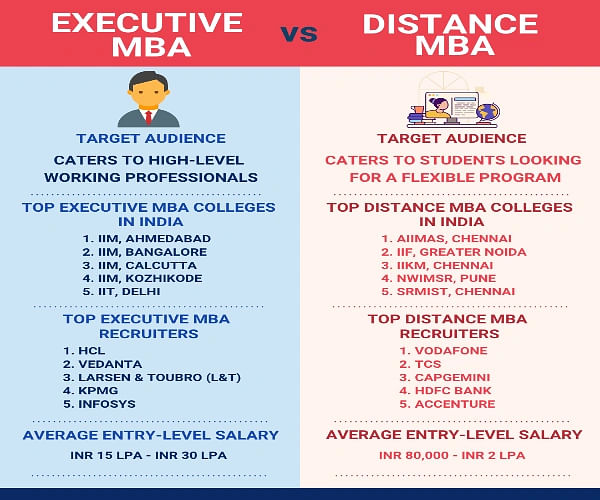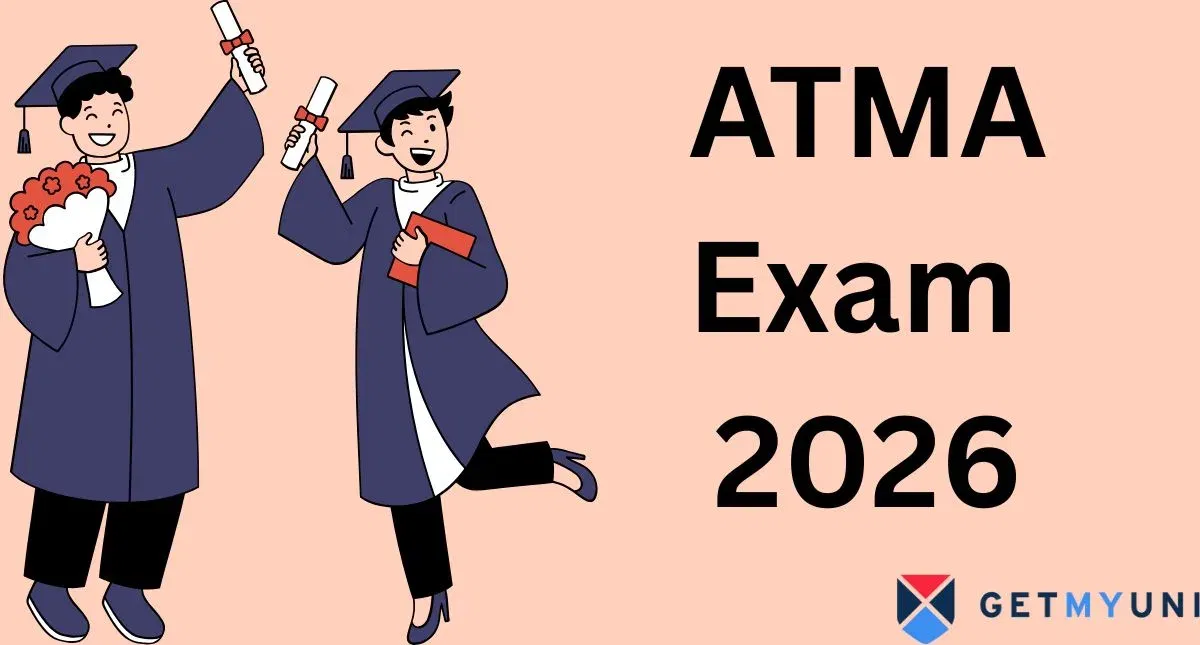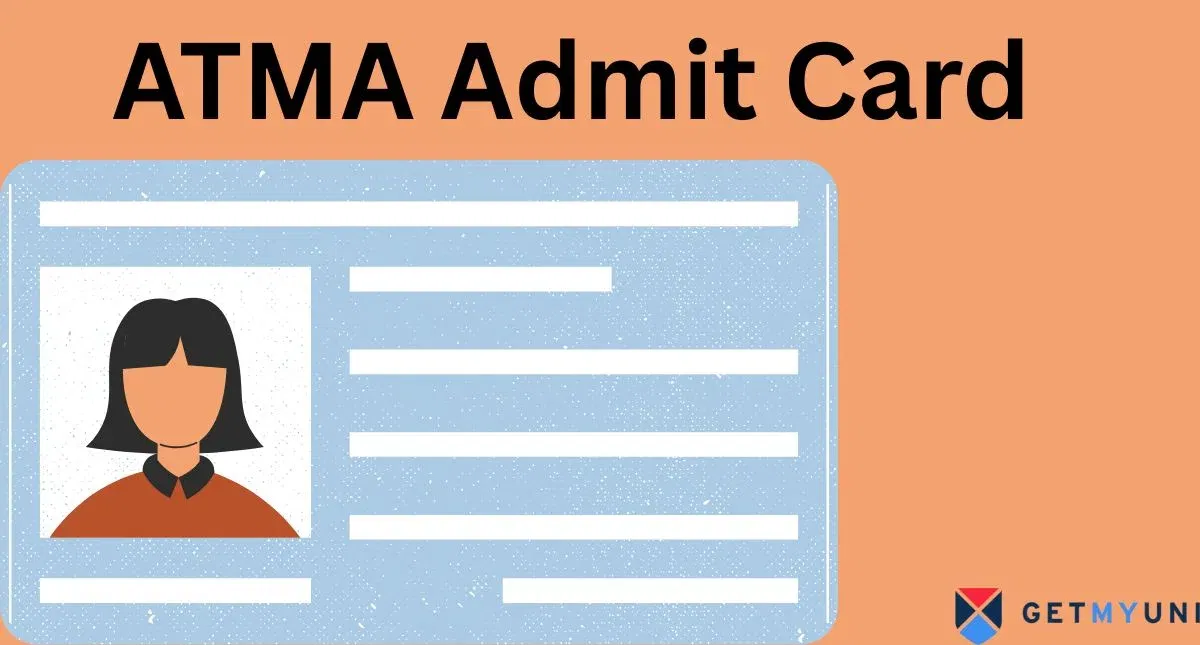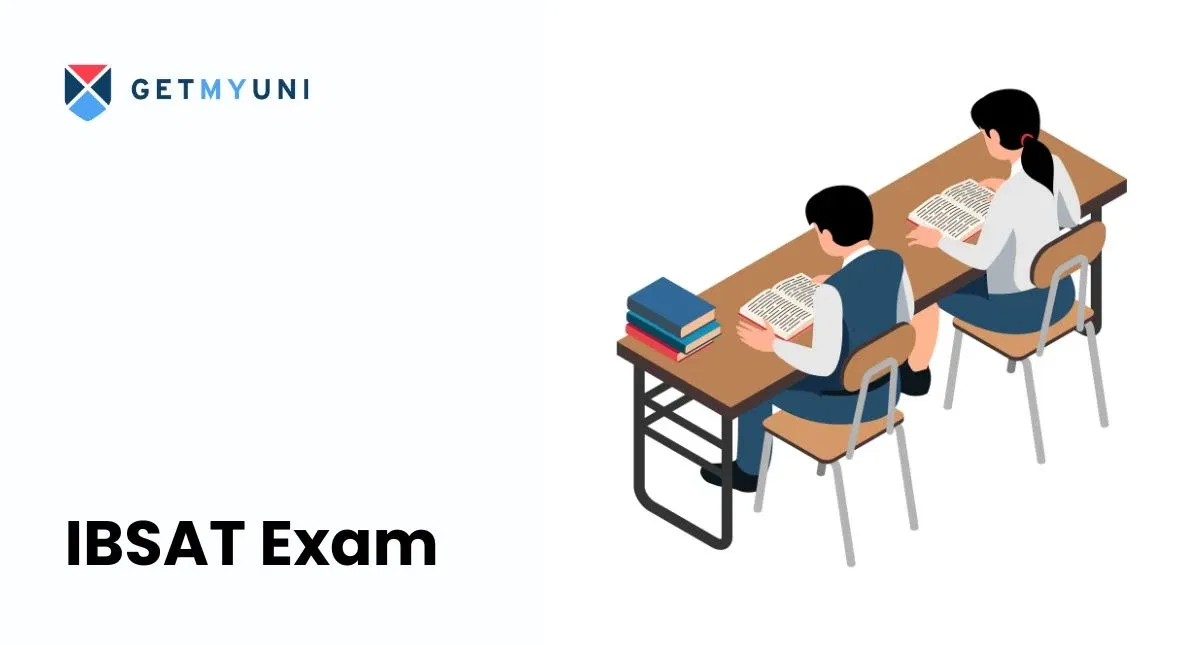Executive MBA is a one-year program that teaches managerial-level management studies, while distance MBA is a business management study program that is conducted remotely.
Table of Contents
- Executive MBA vs Distance MBA Difference
- Eligibility Criteria for Executive MBA and Distance MBA
- Executive MBA Course Duration vs Distance MBA Course Duration
- Admission Process for Executive MBA vs Distance MBA
- Top Colleges for Executive MBA and Distance MBA
- Syllabus for Executive MBA vs Distance MBA
- Difference Between Distance MBA and Regular MBA Job Scope
- Executive MBA or Distance MBA Which is Better?
Executive MBA is an advanced level MBA degree program designed for working professionals, while Distance MBA is a master's in business management degree that is intended to be pursued remotely. In between Executive MBA and Distance MBA, EMBA students learn about the skills required to foster in management roles.
In contrast, you learn about leadership and management skills in distance MBA. You need at least three years of work experience in a managerial position to study for an executive MBA, while no experience is required for a distance MBA. The detailed pros and cons of doing these MBA course has been provided below for your reference.
Executive MBA vs Distance MBA Difference

Between the Executive MBA and the Distance MBA, the Executive MBA is designed for professionals seeking career advancement, while the Distance MBA is designed for young professionals seeking better opportunities. You can go through a brief overview regarding executive MBA vs Distance MBA.
| Particulars | Executive MBA | Distance MBA |
|---|---|---|
| Program Aim | The Program aims to equip professionals with industry specific managerial skills for growth in their career. | The program aims to teach managerial skills required to upskill into a higher position. |
| Course Curriculum | The Executive MBA curriculum is moderately vast consisting of projects, practical based theory. | The curriculum of Distance MBA is quite concise and consists of a very limited theory that is specifically designed for professionals. |
| Eligibility Criteria | Students must have at least a bachelor degree with 50% from a recognised university. Further, they must also have at least three years of work experience. | Candidates must have a bachelor degree with 50% form a recognized university. |
| Teaching Principles | The classes are held online at a specific timing and students are often taken for projects in a real time environment and there is non flexibility provided. | The teaching method is very flexible where students get an opportunity to choose their courses, methods and timings. |
| Course Duration | An Executive MBA course duration is for 1 year and students can take classes part time. | The Distance MBA course duration is for 2 years but students have a flexibility of completing it within 3 to 4 years. |
| Course Fees | INR 15 L- INR 30 L | INR 80,000 - INR 2 L |
| Entrance Exams | CAT, MAT, XAT, NMAT, GMAT etc. | CAT, MAT, XAT, NMAT etc. |
Also Read: MBA For Working Professionals in India - Executive, Online, Distance MBA
As executive MBA and Distance MBA are MBA streams, there is still a wide range of differences between the programs. You can go through the differences among the programs stated below.
Curriculum and Academic Methods
- EMBA program teaches advanced managerial concepts and theories and dives deeper into advanced management tactics to run a business or firm. Students can later utilise these connections and advance in their careers.
- Distance MBAs are more like standard MBA programs and focus on essential management, relations, leadership and teamwork concepts. The core difference is that it is taught online at flexible times compared to standard MBA programs in India.
Networking Opportunities
- As the classes are conducted offline, the learners get good networking opportunities and build real-time connections for better career opportunities.
- Distance MBA is conducted online, so students get ample opportunities to connect and have to put great effort into building better connections.
Time Constraints
- An EMBA is designed to teach in person to the students and doesn't compromise class schedules.
- A Distance MBA requires students to be very disciplined and determined, as there is a lot of flexibility given to the students.
Program Costs Considerations
- Executive MBA is costly, but the return on investment is better as candidates can work in various managerial positions like director, department head, CFO, CTO, etc.
- Distance MBA is a less costly program and doesn't guarantee placement to top companies or job roles.
Eligibility Criteria for Executive MBA and Distance MBA
Distance MBA vs Executive MBA eligibility criteria vary based on the course, requirement, course curriculum, course purpose and learning outcomes. It also depends on the learning needs of the learners and your career aspirations as a whole. In both programs, you must pass a bachelor's with 50% marks from a recognized university.
Yet, Executive MBA candidates, apart from having 50% in your bachelor's, must have at least three years of experience and straightforward entrance exams like CAT, XAT, NMAT, CMAT, GMAT, etc.
In contrast, Distance MBA students must have a bachelor's degree and qualify for entrance exams for some universities, or you can get admissions based on your scores in bachelor's degrees.
Executive MBA Course Duration vs Distance MBA Course Duration
The Executive MBA course is held for one year. It consists of four semesters and one final exam or project work. The subjects taught in executive MBA are management accounting, managerial economics, advanced leadership, marketing management, etc. You usually attend classes part-time while you can work full-time in an organisation.
In contrast, the Distance MBA course duration is two years, but you can extend the course up to 3 or 4 years, depending on your schedule. There is a lot of flexibility in timings, plans, and curricula in the distance MBA program. The subjects taught in Distance MBA are economics, management, human resource management, supply chain and operations management, etc. You get an opportunity to learn in your own time and at your own pace, while there are no strict rules to finish the curriculum in a definite time.
Admission Process for Executive MBA vs Distance MBA
The ones wanting to be admitted to an EMBA program must have at least 2 to 5 years of work experience and knowledge of the industry you want a specialisation degree. You must also have two letters of recommendation from your last studied university or employers. Besides you must qualify management entrance exam and English language test like IELTS, TOEFL etc.
Entrance Exam-Based: In the Entrance-based admission procedure, you have to apply for an entrance exam and clear the entrance exams like CAT, XAT, MAT, GMAT, etc., to secure admissions. The university will shortlist you based on your entrance exam scores apart from the other eligibility requirements for the programs. Usually, Executive MBA programs have entrance-based admission procedures, and some universities typically have your entrance exams for admissions.
The ones wanting to pursue Distance MBA degree must have a bachelor's degree from a recognised university. Usually in Distance MBA programs the admissions are based on the merit. You will be selected based on the bachelors scores and for some universites you have to give the universities admission entrance exam.
Merit-Based: In the Merit-Based admission process, you will be selected based on the scores in the last passing examination or bachelor's degree. You will not be required to sit for any entrance exams, as you will be shortlisted based on your scores.
Also Check: MBA Entrance Exam Syllabus 2025: Exam Pattern, Preparation Tips
Top Colleges for Executive MBA and Distance MBA
There is a wide range of MBA colleges in India to pursue Executive MBA as well as Distance MBA colleges. Candidates can go through the list below to check the best Executive MBA colleges as well the top Distance MBA Colleges.
Also Check: Top 12 Benefits of Executive MBA Program 2025
Syllabus for Executive MBA vs Distance MBA
Executive MBA or Distance MBA syllabus varies in terms of curriculum objective, structure and purpose. You can go through the syllabus for each of the programs stated below.
Executive MBA
Executive MBA programmes follow almost the same syllabus as Regular MBA programmes. The subjects are taught in a more focused manner concerning management. It consists of core and elective subjects besides mandatory issues.
| Executive MBA Syllabus | Subjects | |
|---|---|---|
| Semester 1 | Operations Management Human Resource Management Marketing Management Managerial Economics | |
| Semester 2 | Managerial Economics Organisational Behaviour Organisational Behaviour Financial Reporting and Analysis | |
| Semester 3 | Sales Management Project Management Designing Organisations Macroeconomics | |
| Semester 4 | B2B Marketing Product Management Corporate Strategy and Policy Entrepreneurial Learning | |
Also Check: Executive MBA for Working Professionals in India
Distance MBA
The Distance MBA syllabus consists of topics like management principles, strategic management, Operations management, etc.
| Distance MBA Syllabus | Subjects | |
|---|---|---|
| Semester 1 | Principles and Practices of ManagementQuantitative Techniques for Managerial DecisionsManagerial EconomicsStatistics for ManagementOrganisational Behaviour | |
| Semester 2 | Business LawsMarketing ManagementHuman Resources ManagementOperations ResearchManagerial Communications | |
| Semester 3 | Strategic ManagementInternational BusinessRetail ManagementConsumer Behavior & Marketing Comm. Entrepreneurship and Small Business ManagementMinor Project/ Summer Training Project | |
| Semester 4 | Sales and Distribution ManagementDigital MarketingServices Marketing and CRMGlobal HRMAdvertising and Brand ManagementMajor Project/ Dissertation/ Presentation | |
Also Check: Distance MBA vs Part Time MBA: Eligibility, Top Colleges, Career Scope
Difference Between Distance MBA and Regular MBA Job Scope
Amongst Executive MBA vs Distance MBA, you can work as CTO, CXO, CFO or in founding management positions and earn more than INR 30 L per year. The Executive MBA Salary, Jobs, Scope in India will depend on the skills, experience and expertise of the learner.
In contrast, the Distance MBA Salary, Jobs, Placements, Scope in India are as follows:
| Executive MBA Job Profiles | Average Annual Salary |
| Senior Manager | INR 10 LPA |
| Human Resources (HR) Business Partner | INR 15 LPA |
| Senior Generalist | INR 17 LPA |
| Senior Consultant | INR 25 LPA |
| Operations Head | INR 30 LPA |
| Distance MBA Job Roles | Average Annual Salary |
| Corporate Associate | INR 4.4 LPA |
| HR Manager | INR 3.4 LPA |
| Financial Analyst | INR 3.8 LPA |
| Credit Risk Manager | INR 4.5 LPA |
| Portfolio Manager | INR 4.1 LPA |
Top Recruiters for Executive MBA vs Correspondence MBA
There is a wide range of recruiters for executive MBAs and distance MBAs like Amazon, Dell, Infosys, etc. You can find the top recruiters for both the programs in the table below.
| Programs | Top Recruiters |
|---|---|
| Executive MBA | HCL, Vedanta, Larsen & Toubro (L&T), KPMG, Hindustan Unilever (HLL), Infosys, Trident Group, Cadbury etc. |
| Distance MBA | Vodafone, TCS, Capgemini, HDFC Bank, Jindal Steel and Power, Accenture etc. |
Executive MBA or Distance MBA Which is Better?
Choosing between an Executive MBA and a Distance MBA can be challenging choices as both are slightly different MBA programs. Below are specific pointers that you must keep in mind while selecting your preferred MBA program, between Executive MBA and Distance MBA.
- If you are more inclined towards upper management can go for an executive MBA as it teaches advanced management skills and theories. At the same time, the Distance MBA program can be opted for getting essential to moderate knowledge regarding the management industry.
- If you want to switch to a founder or higher management position in your career from a manager can opt for an executive MBA, while the ones wishing to work on an executive MBA and don't want to quit a job for studies can go for a distance MBA.
- Executive MBA is a part-time as well as full-time course without much flexibility, while distance MBA can be done anytime from anywhere online.























POST YOUR COMMENT